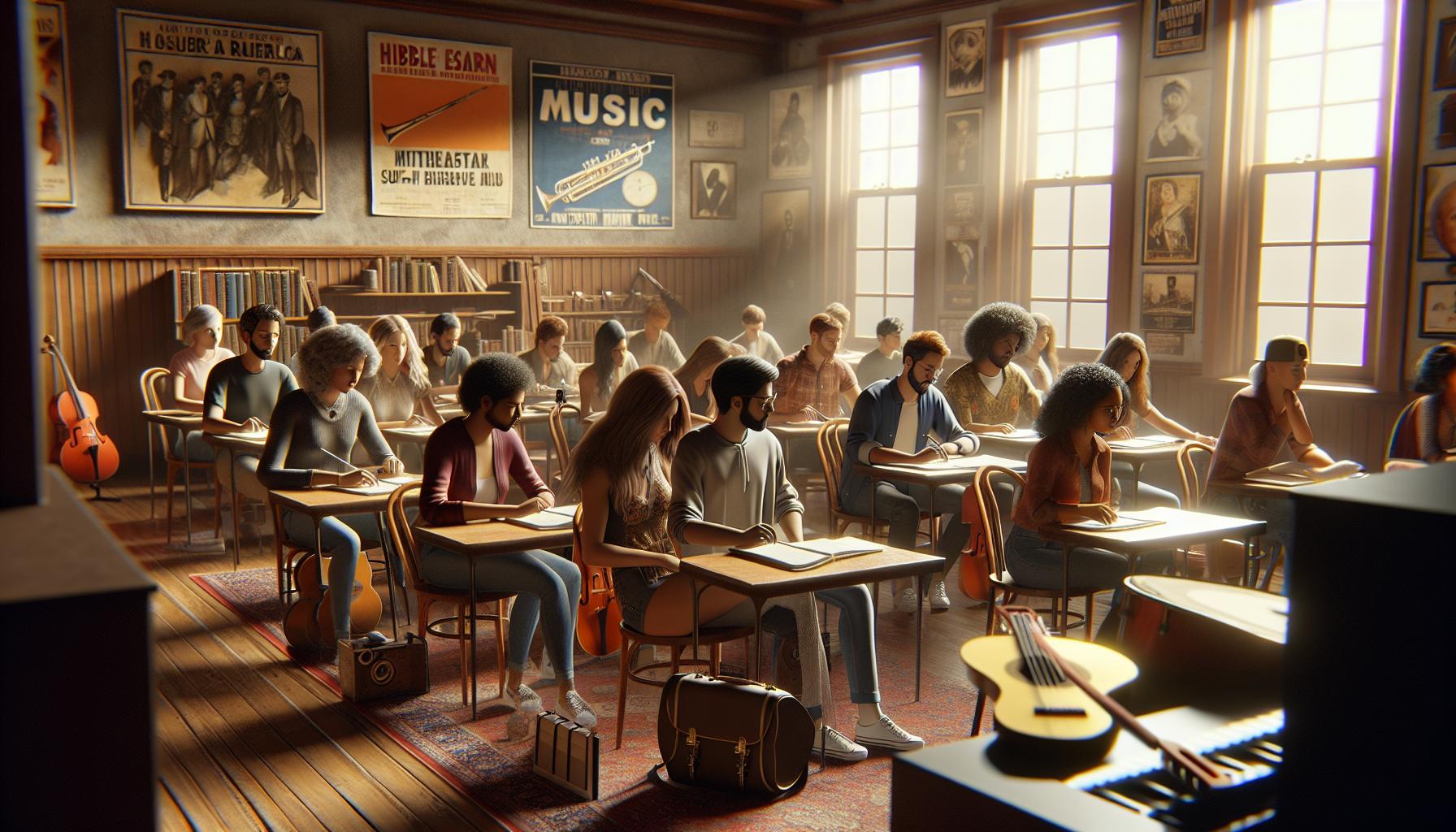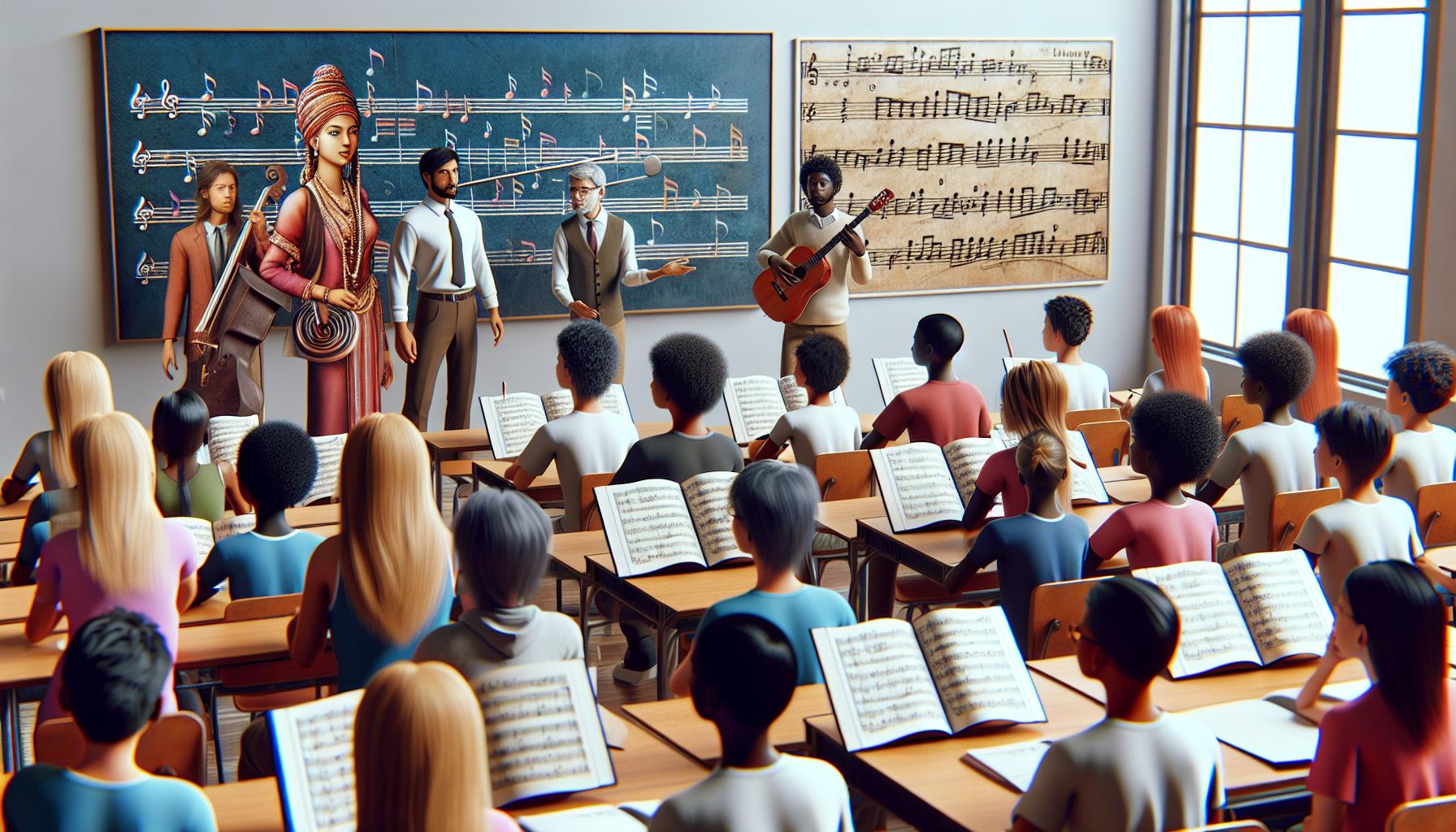Music history textbooks serve as essential guides through the rich tapestry of sound that has shaped cultures and societies. From ancient chants to contemporary genres, these texts illuminate the evolution of music and its profound impact on human expression. They provide insights into the lives of iconic composers, the development of musical styles, and the societal influences that have driven change throughout the ages.
In an era where digital media often overshadows traditional learning, a well-crafted music history textbook remains invaluable for students and enthusiasts alike. It offers structured knowledge, engaging narratives, and a deeper appreciation for the art form. Understanding music history not only enriches one’s listening experience but also fosters a connection to the diverse cultural heritage that music embodies.
Key Takeaways
- Comprehensive Resource: Music history textbooks serve as essential guides that detail the evolution of music and its cultural significance throughout history.
- Importance of Education: Understanding music history enriches listening experiences and fosters connections to diverse cultural heritages, enhancing appreciation of contemporary works.
- Key Influences: Textbooks outline significant composers, musical styles, and historical events that have shaped the development of music, linking artistic expression to societal changes.
- Quality Criteria: High-quality music history textbooks prioritize accuracy, comprehensiveness, clarity, scholarly rigor, and engagement to enhance the learning experience.
- Impact on Curriculum: These textbooks inform curriculum design in music education, establishing vital frameworks and inspiring inclusive approaches that integrate diverse music traditions.
- Engagement Techniques: Incorporating multimedia resources and interactive elements in music history textbooks fosters deeper student engagement and critical thinking in music education.
Music History Textbook
Music history textbooks serve as comprehensive resources, detailing music’s evolution and its impact on cultures and societies globally. They enhance students’ and enthusiasts’ understanding of music, bridging historical contexts with artistic expression.
Importance of Music History Education
Music history education offers essential knowledge about significant composers, influential genres, and key historical events that shaped music. It cultivates critical thinking skills by encouraging analysis of musical texts and cultural contexts. Understanding music’s heritage fosters appreciation for contemporary works and helps students connect with the broader narrative of artistic innovation.
- Evolution of Musical Styles: Music history textbooks detail the progression from Baroque to Contemporary styles, illustrating the transformation and influences over centuries.
- Cultural Contexts: These texts examine how social, political, and technological changes influence music, highlighting connections between music and society.
- Influential Composers: Textbooks profile pivotal composers, such as Bach, Beethoven, and Stravinsky, detailing their contributions and societal impacts.
- Music and Identity: Resources explore the role of music in shaping cultural and personal identities, emphasizing its significance in various communities.
- Global Perspectives: Texts include a diverse range of music traditions worldwide, showcasing the richness of global musical heritage and its interconnectedness.
Notable Music History Textbooks

Music history textbooks serve as critical resources for understanding the evolution of music. They encompass classic and contemporary works that offer unique insights into musical development.
Classic Textbooks
Classic music history textbooks lay the foundation for understanding music’s past. Key examples include:
- “A History of Western Music” by Donald Jay Grout and Claude V. Palisca: This textbook spans from ancient times to the 20th century, emphasizing the social and cultural contexts of music’s evolution.
- “Music in Western Civilization” by Mark E. Moore: This text discusses significant developments within Western music from medieval through modern periods, offering detailed analysis and historical contexts.
- “The Oxford History of Western Music” by Karlheinz Stockhausen: This comprehensive resource explores music’s history through a series of volumes, providing an in-depth perspective on various musical eras and styles.
These works have stood the test of time, forming an essential part of music education curricula.
Contemporary Textbooks
Contemporary music history textbooks address modern influences and methodologies. Notable examples include:
- “The New Grove Dictionary of Music and Musicians” edited by Stanley Sadie: This reference work features extensive entries on composers, genres, and musical terminology, emphasizing diversity in music history.
- “The Cambridge History of Music” edited by Mark Everist: This series covers various traditional and contemporary forms of music, highlighting their significance in cultural and historical contexts.
- “Music Since 1945: Issues, Concepts, and Traditions” by Richard Toop: This textbook examines the complexities and innovations of music created post-1945, providing critical insights into contemporary music trends.
These resources offer updated perspectives, reflecting current scholarly discourse and activity in the field of music history.
Evaluating Content Quality

Evaluating the quality of music history textbooks requires careful consideration of various criteria. High-quality texts provide thorough, accurate, and engaging content that enhances the learning experience.
Criteria for Assessment
- Accuracy: Textbooks should present factually correct information, including dates, events, and biographical details about composers and musical styles.
- Comprehensiveness: Texts ought to cover a wide range of musical periods, styles, and cultural influences, ensuring a well-rounded perspective.
- Clarity: Language should be clear and accessible, making complex concepts understandable for students at various levels of expertise.
- Scholarly Rigor: Texts must reference credible sources and include citations, presenting well-researched viewpoints supported by academic scholarship.
- Engagement: Content must engage readers through compelling narratives, case studies, or examples that connect music to broader social and historical contexts.
- Organization: A structured layout facilitates learning, with clear headings, subheadings, and summaries to assist with navigation and retention.
- Multimedia Integration: Inclusion of images, audio clips, or links enhances the learning experience by providing audio-visual contexts to the text.
- Chronological Framework: Textbooks that arrange content chronologically assist readers in understanding the evolution of musical styles and influences over time.
- Diverse Perspectives: Incorporating global music traditions offers a richer understanding of music’s interconnectedness across cultures and societies.
- Biographical Insights: Texts featuring detailed profiles of composers and musicians provide depth, illustrating their contributions to music and cultural history.
- Critical Thinking Prompts: Inclusion of discussion questions or prompts encourages readers to analyze and synthesize information, fostering critical engagement.
- Appendices and Glossaries: Adding these resources helps clarify terminology and provides additional references for further study.
- Digital Companion Resources: Textbooks that offer online resources or companion websites for interactive learning enhance the educational experience.
Impact on Music Education

Music history textbooks significantly shape music education by providing structured content that informs curriculum design and enhances student engagement. These resources equip educators with essential tools to deliver comprehensive music instruction.
Influence on Curriculum Design
Curriculum development in music education relies heavily on music history textbooks. They establish fundamental frameworks that guide educators in constructing courses. Textbooks define essential topics, including music theory, historical periods, and cultural contexts, ensuring that students receive a well-rounded education. Standards and learning objectives often stem from the content offered in these textbooks, promoting consistency across various educational institutions.
Comprehensive textbooks integrate diverse musical styles and traditions, inspiring educators to create inclusive curricula that reflect global perspectives. They encourage the inclusion of various genres, from classical to contemporary, aligning educational goals with students’ interests and cultural backgrounds.
Student Engagement and Understanding
Music history textbooks enhance student engagement by incorporating interactive elements and multimedia resources. Engaging visuals, audio samples, and online resources facilitate a more immersive learning experience. When students encounter historical contexts alongside musical examples, they develop deeper connections to the material.
Students’ understanding deepens through the biographical narratives of composers and performers depicted in these texts. By exploring personal stories and influences, students relate to the music on an emotional level. Literature that fosters critical thinking stimulates classroom discussions, encouraging students to analyze and evaluate musical works and their societal impacts.
Ultimately, music history textbooks play a crucial role in transforming the music education landscape, enriching curricula, and fostering student engagement.
Connections Between Music And Cultural Identity
Music history textbooks serve as indispensable guides for anyone seeking to understand the rich tapestry of musical evolution. They not only illuminate the lives of iconic composers but also reveal the intricate connections between music and cultural identity. By offering a structured approach to learning about diverse musical traditions, these resources enhance educational experiences and foster a deeper appreciation for the art form.
As digital media continues to grow, the relevance of well-crafted textbooks remains undeniable. They provide a foundation for critical thinking and engagement that enriches music education. Ultimately, music history textbooks are vital tools that empower students and enthusiasts to explore the complexities of music’s past while connecting with its present and future.
